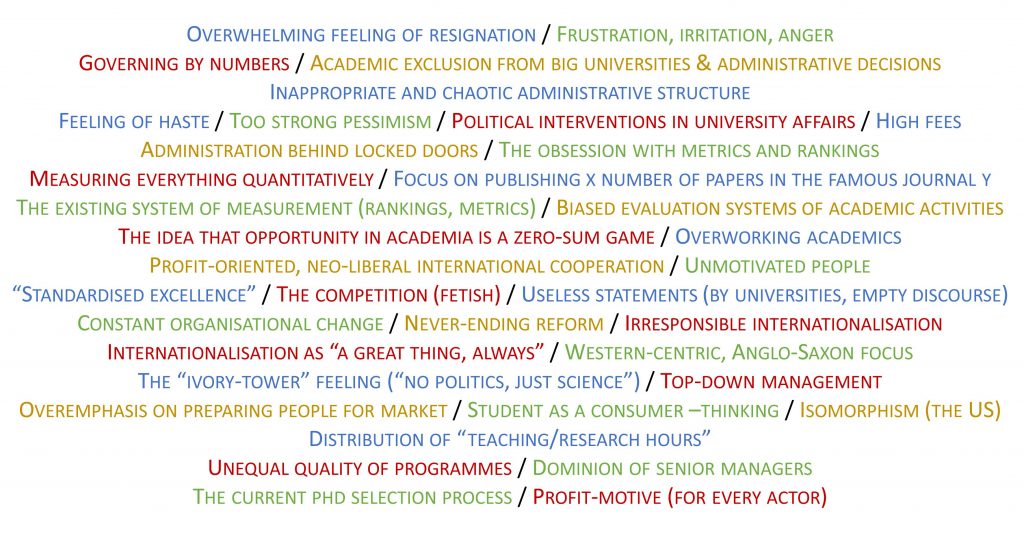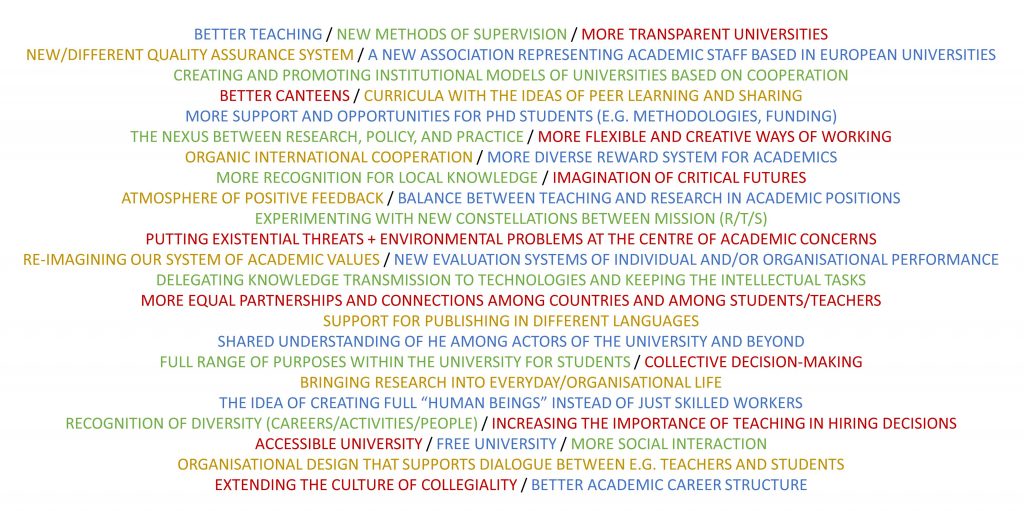This post was written jointly with Daniel Kontowski.
We often criticise universities, but do we ever pause to think what an ideal one would look like? Earlier this month we had a rare opportunity as doctoral students to participate in a “search conference” together with around 30 other higher education scholars. This conference, which took place at the Danish School of Education in Copenhagen, officially kicked off the project called “European Universities – Critical Futures”. The aim of the project is to address the question “What are the future roles of universities in creating social and regional integration in Europe, in a shifting global context?”.
What is a search conference?
We were in a good company: Not only were there researchers in all career stages, there was Professor Davydd Greenwood, who has a vast knowledge and experience of conducting search conferences and action research in organisations, communities and, not least, universities. As he writes together with Morten Levin: “A search conference is ‘a work form for participatory planning and design. The aim of search conference techniques is to allow for collective planning and design of actions aimed at solving problems directly relevant to the people involved. It is a collective process of inquiry, creating learning options for all those participating, moving from plans to concrete actions.” (p. 136).
And that’s what we were doing. A search conference consists of several different stages, starting from the creation of something called “shared history” and ending in discussions about future collaboration. For us who were in Copenhagen these stages spread across three days. While this felt a very short period of time for everything we wanted to discuss, there were some extremely interesting moments during these days. Our personal favourite was an exercise called “Keep, drop, create”. In small groups, we had to create three lists:
- What to keep in current universities / HE research?
- What to drop from current universities / HE research?
- What to create for future universities / HE research?
Here are the results:
Keep: quality, community, diversity, FREEDOM!
Despite all the dissatisfaction with our work, when we started thinking about it there were actually quite a lot of things we liked in academia or in our work. And that is extremely important to keep in mind, as the existing features of universities are the ones on top of which we build new features. This is the “keep list” we created (though not necessarily agreed on):

Drop: numbers, “excellence”, consumer/profit-oriented thinking
When we got to the “drop” part, people’s frustrations started emerging. Despite that, we still had a lot of fun when opening up about these frustrations to each other. This is what the “drop list” finally looked like:

Create: “better”, “more”, “new”
The best part of the entire exercise, however, was to brainstorm how our ideal university and higher education system or research would look like in the future. What was particularly inspiring was the fact that there were many ideas, much more than in the two first lists. Many of them also seemed to be based on existing structures or practices, starting with the words “more” or “better”. This, we gathered, means that we’re already doing something right but there’s room for improvement.

Of course, some of the items on the lists above are highly dependent on the country or institution the person who wrote it down is working in. However, finding agreement and to create an exclusive list for any of the three categories wasn’t the purpose of the exercise. Instead, this was meant to be a task among a few others to start discussing the potential futures of European universities. In this, we thought it was quite successful.
With the help of these three lists we then began creating larger categories, which later on helped us form thematic discussion groups. Within these groups we then started to plan possible avenues for future collaboration. While we can’t yet know where all this will lead to, it was certainly an interesting way of trying to make sense of what it is we’re trying to accomplish.
The list might, of course, look very different if there had been a different group of thirty other HE researchers in the room, or a group of people representing entirely different disciplines.
What would you keep, drop, and create?
Melina Aarnikoivu is a doctoral student at the Centre for Applied Language Studies at the University of Jyväskylä, Finland. Her dissertation is a nexus analysis of becoming a scholar. Her work can be found at ResearchGate.
Daniel Kontowski studies liberal arts education in contemporary Europe as a PhD student at the University of Winchester (UK). He is a co-founder of the European Liberal Arts Initiative (ELAI). You can follow Daniel on Twitter.
